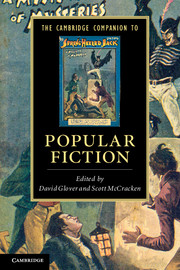Book contents
- Frontmatter
- Introduction
- 1 Publishing, history, genre
- 2 Fiction, theatre and early cinema
- 3 Television and serial fictions
- 4 The public sphere, popular culture and the true meaning of the zombie apocalypse
- 5 The reader of popular fiction
- 6 Reading time: popular fiction and the everyday
- 7 Gender and sexuality in popular fiction
- 8 Pulp sensations
- 9 Bestselling fiction: machinery, economy, excess
- 10 Comic books and graphic novels
- 11 Popular fiction in the digital age
- Further reading
- Index
- Cambridge Companions to …
9 - Bestselling fiction: machinery, economy, excess
Published online by Cambridge University Press: 28 May 2012
- Frontmatter
- Introduction
- 1 Publishing, history, genre
- 2 Fiction, theatre and early cinema
- 3 Television and serial fictions
- 4 The public sphere, popular culture and the true meaning of the zombie apocalypse
- 5 The reader of popular fiction
- 6 Reading time: popular fiction and the everyday
- 7 Gender and sexuality in popular fiction
- 8 Pulp sensations
- 9 Bestselling fiction: machinery, economy, excess
- 10 Comic books and graphic novels
- 11 Popular fiction in the digital age
- Further reading
- Index
- Cambridge Companions to …
Summary
‘Brand new bestseller’
A train arrives at the station of a provincial English town. A dozing passenger glances out of the window of a second-class carriage. His eye is caught by a poster advertising a work of fiction: most of the sheet is taken up by an image of the book's cover, a shadowy figure (possibly a woman) looking provocative or threatening from beneath the wide brim of a dark hat over which the title (Killing Time or Fatal Passion ?)is boldly splashed. A writer's name is highlighted at the bottom (possibly that of a man). It, too, barely registers. The passenger's gaze is held by an untidy strip cutting diagonally across the poster, as if it were pasted on separately and in haste, the urgency of the style designed precisely to urge passers-by to pay attention to the information on display: ‘the brand new bestseller out on …’. Like the title and the writer's name, the date is forgotten, only the fact that it is a short while in the future is noted: this bestseller is yet to be published.
‘Brand new bestseller’: everything about bestselling fiction can be found in the phrase, in the setting, and in the (forgotten) details of its advertisement. The latter makes its appeal to readers on the basis of a familiar and instantly recognisable genre: the half-remembered cover and clichéd titles, connoting ‘sex’, ‘mystery’ and ‘danger’, suggest thriller/detective fiction (‘killing’ and ‘fatal’) or romance (‘passion’).
- Type
- Chapter
- Information
- The Cambridge Companion to Popular Fiction , pp. 159 - 174Publisher: Cambridge University PressPrint publication year: 2012
- 1
- Cited by



